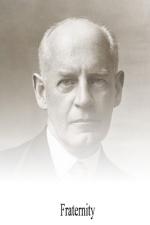And still he lay there silent. From the narrow street where no traffic passed, the cries of a coster and distant whistlings mounted through the unwholesome air. Some sparrows in the eave were chirruping incessantly. The little sandy house-cat had stolen in, and, crouched against the doorpost, was fastening her eyes on the plate which, held the remnants of the fish. The seamstress bowed her forehead to the flowers on the table; unable any longer to bear the mystery of this silence, she wept. But the dark figure on the bed only pressed his arms closer round his head, as though there were within him a living death passing the speech of men.
The little sandy cat, creeping across the floor, fixed its claws in the backbone of the fish, and drew it beneath the bed.
CHAPTER XXXIX
THE DUEL
Bianca did not see her husband after their return together from the Round Pond. She dined out that evening, and in the morning avoided any interview. When Hilary’s luggage was brought down and the cab summoned, she slipped up to take shelter in her room. Presently the sound of his footsteps coming along the passage stopped outside her door. He tapped. She did not answer.
Good-bye would be a mockery! Let him go with the words unsaid! And as though the thought had found its way through the closed door, she heard his footsteps recede again. She saw him presently go out to the cab with his head bent down, saw him stoop and pat Miranda. Hot tears sprang into her eyes. She heard the cab-wheels roll away.
The heart is like the face of an Eastern woman—warm and glowing, behind swathe on swathe of fabric. At each fresh touch from the fingers of Life, some new corner, some hidden curve or angle, comes into view, to be seen last of all perhaps never to be seen by the one who owns them.
When the cab had driven away there came into Bianca’s heart a sense of the irreparable, and, mysteriously entwined with that arid ache, a sort of bitter pity: What would happen to this wretched girl now that he was gone? Would she go completely to the bad—till she became one of those poor creatures like the figure in “The Shadow,” who stood beneath lampposts in the streets? Out of this speculation, which was bitter as the taste of aloes, there came to her a craving for some palliative, some sweetness, some expression of that instinct of fellow-feeling deep in each human breast, however disharmonic. But even with that craving was mingled the itch to justify herself, and prove that she could rise above jealousy.
She made her way to the little model’s lodging.
A child admitted her into the bleak passage that served for hall. The strange medley of emotions passing through Bianca’s breast while she stood outside the girl’s door did not show in her face, which wore its customary restrained, half-mocking look.




